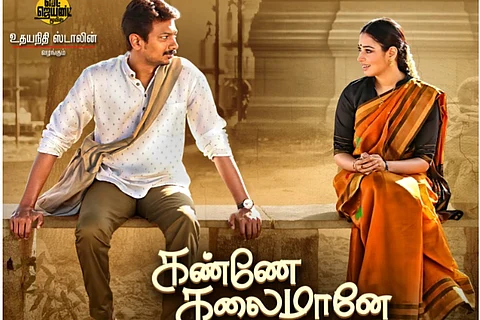'Kanne Kalaimaane' review: An interesting drama with a few quibbles
Seenu Ramaswamy’s Kanne Kalaimaane takes you back to the green fields, shady farms, and narrow one-line pathways that are ubiquitous to a village. The director is at his elemental best in the film, giving us a whiff of life in the villages. While the film’s story has been told with passion, it’s flaw lies in being scattered, with a few loose ends.
Udhayanidhi Stalin plays Kamalakkannan, a BSc Agriculture graduate who chooses to become an evangelist for organic farming. He runs his own vermi composting yard and insists all farmers opt for organic manure instead of chemicals. Tamannaah plays Barathi, a young and honest bank officer who is transferred to Cholavandan, Kamalakannan’s village. Dressed in crisp and bright cotton sarees and high collared blouses (her looks modelled after late Chief Minister J Jayalalithaa), Barathi takes it upon herself to make sure all loans from the bank are repaid regularly, and featuring first on her radar is Kamalakkannan’s name.
Thus begins their association that gradually matures into love. Thankfully, there’s no background music and wind blowing on one’s face when the two meet. Kamalakkannan does nothing to woo her and Barathi does not blush and turn away when he’s around. The director gives us a strong sense of the two, of what they stand for, before jumping into their interest in each other.
While this needs to be appreciated, where it fails is that it leads you in one direction while deviating from its path in the second half.
There’s the usury angle, strong dialogues made on the plight of farmers who borrow money or apply for loan, on young children who prepare for national entrance exams like NEET from far corners of the country with inadequate facilities, that one hopes for these angles to be pursued rather than being dropped unceremoniously, like the jagged end of a cliff, while continuing to wind around a different path altogether.
Yet, Kanne Kalaimaane is not the story of an organic farmer or a just bank officer. It is the story of love in a marriage and how deep the bond can get. The film in fact takes its crux from the 40th Kurunthogai, a Sangam age Tamil poetry written by Cempulappeyanirar, that flashed on screen briefly before the title.
Seenu gives opportunities for both his leads to deliver dialogues on current issues, yet it is Udhayanidhi who gets a bigger share of the cake. From farmer suicides to NEET to a tight frame for the question ‘are you a communist’, Kanne Kalaimaane’s first half gives ample scope for the young star to make political statements.
In places like these it is evident that Udhayanidhi is quite cautious, not wanting to go overboard, and only does what’s required. Given that he’s still relatively fresh from his Oru Kal Oru Kannadi days, these dialogues sound natural and not like entitled “punches”.
Kanne Kalaimaane has two very strong female characters played by Tamannaah and Vadivukkarasi. It also draws an interesting arc between the two very different women, one a matriarch who wields absolute control over her family, and the other, a working woman from a small family who values her education and her job.
The director also does away playing the two women against each other with caustic remarks.
Interestingly, the film balances both Kamalakkannan and Barathi quite equally, never tipping one over in favour of the other. Kamalakkannan never once questions or challenges his working wife, shares household chores and in one scene, where any other film might have given us a raunchy first-night song, goes to bed when he finds his newly wed wife sleeping.
Kanne Kalaimaane also gives us aesthetically beautiful frames and lush wide angles, filmed at a location where its hard not to come by such shots.
All songs in the film are shot in montages and this makes it more natural. The music in this film works in two ways. While it is brilliant in itself, composed by Yuvan, it becomes a tad too much in certain places, nudging us to emote before anything big can happen on screen.
Kanne Kalaimaane begins on a broad note and finds its tone only in the second half. However, if the opening poetry that was displayed on screen for a few seconds was explained further, its premise would’ve made more sense to its viewers.
யாயும் ஞாயும் யார் ஆகியரோ?
எந்தையும் நுந்தையும் எம் முறைக் கேளிர்?
யானும் நீயும் எவ் வழி அறிதும்?
செம் புலப் பெயல் நீர் போல
அன்புடை நெஞ்சம் தாம் கலந்தனவே.
Translation (by AK Ramanujan):
What could my mother be
to yours? What kin is my father
to yours anyway? And how
Did you and I meet ever?
But in love
our hearts have mingled
as red earth and pouring rain.
Disclaimer: This review was not paid for or commissioned by anyone associated with the film. Neither TNM nor any of its reviewers have any sort of business relationship with the film’s producers or any other members of its cast and crew.

